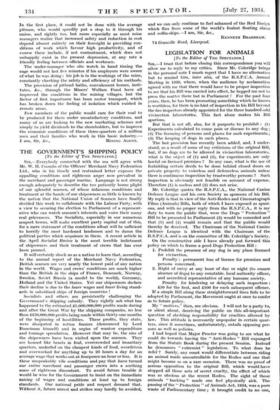THE GOVERNMENT'S SHIPPING POLICY
[To the Editor of THE SPECTATOR.] SIR,—Everybody connected with the sea will agree with Mr. W. H. Coombs of the Officers' Merchant Navy Federation Ltd., who in his timely and restrained letter exposes the appalling conditions and righteous anger now prevalent in the merchant and passenger marine. Language is not strong enough adequately to describe the too patiently borne plight of our splendid seamen, of whose infamous conditions and treatment at the hands of our shipowners so little is known by the nation that the National Union of Seamen have finally decided this week to collaborate with the Labour Party, with a view to securing the election to Parliament of a represent- ative who can watch seamen's interests and voice their many real grievances. The Socialists, especially in our numerous seaport towns, will make excellent party capital out of this, for a mere statement of the conditions afloat will be sufficient to horrify the most hardened landsmen and to damn the political parties which acquiesce in them. A recent article in the April Socialist Review is the most terrible indictment of shipowners and their treatment of crews that has ever been penned.
It will certainly shock us as a nation to learn that, according to the annual report of the Merchant Navy Federation, British seamen are very nearly the lowest paid of any nation in the world. Wages and crews' conditions are much higher than the British in the ships of France, Denmark, Norway, Sweden, Soviet Russia (a model to the world), Germany, Holland and the United States. Yet our shipowners declare their decline is due to the lower wages and lower living stand- ards in subsidized ships of foreign countries !
Socialists and others are persistently challenging the Government's shipping subsidy. They rightly ask what has happened to the estimated £1,000,000,000 profits made during and after the Great War by the shipping companies, no less than £350,000,000 profits being made within thirty-one months of the beginning of hositilities. These profits, they state, were dissipated in rotten finance (denounced by Lord Runciman himself) and in orgies of wanton expenditure and tonnage speculation. However that may be, the sins of the shipowners have been visited upon the seamen. They are housed like beasts in foul, overcrowded and insanitary quarters, underfed on the cheapest kinds of food, overdriven and overworked for anything up to 20 hours a day for an average wage that works out at fourpence an hour or less. It is these unspeakably vile conditions and pay that have turned our entire merchant and passenger crews into a seething mass of righteous discontent. To avoid future trouble it would be wise for the Government to insist on the immediate raising of wages and conditions at least up " to foreign standards. Our national pride and respect demand that. Without it, future unrest and strikes may hardly be avoided,
and we can only continue to feel ashamed of the Red Ensign which flies from some of the world's foulest floating slum and coffin-ships.—I am, Sir, &c.,
74 Granville Road, Liverpool. KENNETH BRADSHAW.


































 Previous page
Previous page